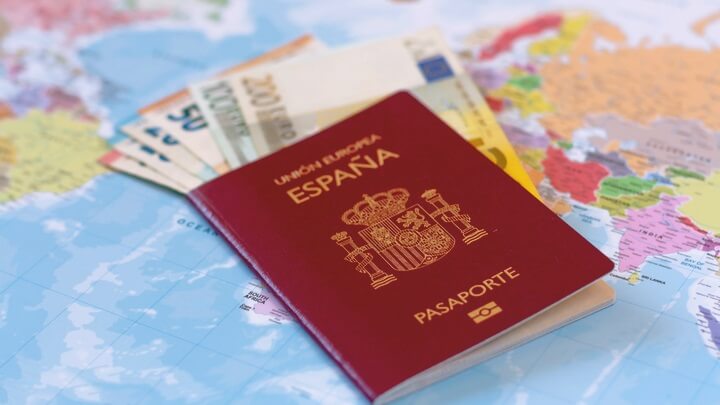Spain spouse visa requirements - UK guide
Read our guide on Spain spouse visa requirements, covering eligibility and documents needed to join your partner in Spain.

Whether you’ve been an expat in Spain for many years or you’re considering relocating there for the first time, there’s a lot to know when it comes to the roadblocks and intricacies of becoming a Spanish citizen. That being said, many people find that enjoying the lifestyle is well worth the complex process of applying for Spanish citizenship.
That’s because life in Spain tends to have broad appeal to expats for a number of reasons. First and foremost, it’s widely regarded as having the best year-round climate among European countries. The Southern Blanca region has an average of 320 days of sunshine per year, and low recorded rainfall.
Spain is also estimated to have lower costs for owning property compared to the UK. Also, food and heating are noticeably cheaper than in other places. Throw in Spain’s reputation for fantastic cuisine, including fresh seafood and the country’s vast array of fine wines, and it would be difficult for anyone to resist this European country’s charm.
Regardless of whether you’re moving to start a business, find a job or just enjoy all that Spain has to offer, this guide will walk you through the most important points and steps for applying for a Spanish citizenship.
Spain is one of the many European countries that make up the European Union. As a Spanish citizen, you’ll have the right to vote, which gives you the ability to influence political decision-making, not only in Spain, but in the EU as a whole.
More importantly, you’ll be able to carry a Spanish passport, which acts as a “golden ticket” for exploring the rest of the European Union. Upon becoming a Spanish citizen, you’ll have the right to visit, live and work freely within all of the countries that belong to the EU.
There isn’t a single path to becoming a Spanish citizen.
The following three are the most common ones;
For many people, this is the most common way to get a Spanish citizenship. It’s also known as getting citizenship by naturalisation.¹
These are the main requirements;
You can do both exams at the Instituto Cervantes and your documents need to be translated and legalised through consular departments.
The whole process can take up to three years so prepare to be patient.
If you’re married to a Spanish citizen and you have a legal residence permit for more than a year, this might be a good solution for you.² If you’re thinking of marrying a Spanish citizen, you might consider doing it in Spain, otherwise you’ll have to deal with an extra step when it comes to bureaucracy.
The easiest way to become a Spanish citizen is through your parents – a process in which you can qualify by either origin or birth – and doesn’t require a residency period.
You’re considered Spanish by origin and can apply for citizenship by 'Option' if you have a Spanish mother or father, if you’re under the age of 18 and have been adopted by a Spaniard, or over the age of 18 and have been adopted by a Spaniard within the last two years.²
Additionally, if you were born in Spain to foreign parents or if at least one parent was also born in Spain (except children of diplomats and consuls accredited in Spain), you’re eligible for Spanish citizenship by birth. The same applies if you were born in Spain to foreign parents whose identity is unknown or country of origin is undetermined (stateless or refugee status), or if neither parents’ nationality could be legally passed on to you.
If you’re unable toapply for citizenship by birth or origin, there are some other ways to become a Spanish citizen. For example, the new GrandChildren law allows people of Spanish descent to apply for citizenship.³
There are a few exceptions to the 10-year requirement.² For example, refugees are eligible to apply after only five years of residence.
Nationals from Ibero-American countries are eligible to apply for citizenship after just two years of residence. Countries whose nationals are included in this policy are Andorra, the Philippines, Equatorial Guinea, Portugal and those of Sephardic origin.
The required period of residence is only one year if you’re born in Spain to legal foreign residents, married to a Spaniard, widowed from a Spaniard or the child or grandchild (even if born outside Spain) of a Spanish national by birth or residence.
Additionally, descendants of expelled Sephardic Jews from Spain can apply for Spanish citizenship without residing in Spain if they can prove special connections to Spain and pass tests on the Spanish language and history. The law is still in effect for humanitarian reasons and extraordinary cases.⁴
Before one is able to apply for citizenship in Spain, in order to meet the 10 years of residence criteria he or she will need to apply for permanent residency. Permanent residents are required to have lived in Spain for at least five years.⁵
Residency must be legal and continuous immediately prior to the application. If any of your time in Spain is spent as a student, that time won’t be considered legal residency and therefore cannot be applied towards applications por residencia.
Once you have legally lived in Spain for five uninterrupted years, non-EU nationals can apply for an 'EU long-term residence permit'.⁶
A long-term residence permit allows you to stay in Spain indefinitely working or otherwise, under the same conditions as Spanish citizens.
You have to prove that you have adequate financial resources to provide for you and your dependents – such as pension, scholarship or salary – and proof of public or private health insurance with a company authorized to operate in Spain.
If you’re applying for permanent residence in Spain, you'll likely be asked to submit the following documents⁷ that should be translated into Spanish:
Applicants will also be required to prove that they’re ‘good citizens’ – financially stable with no criminal record – and be deemed by the authorities to have a ‘sufficient’ degree of integration into Spanish society.
For example, being able to speak Spanish and taking part in social activities that are part of the Spanish way of life will contribute to your clout as a potential citizen.
To get a permit, you have to apply at the Civil Registry closest to you. You’ll need to take along the required supporting documents for your Spanish citizenship application plus a completed Spanish citizenship application form.
You can apply for Spanish citizenship if you’re 18 or older, 14 or older with legal assistance, or citizenship can be applied for on your behalf by a legal guardian if you’re younger than 14.
Those applying for Spanish Citizenship through residency will fill out this application form and submit it at the Spanish Civil Registry (Registro Civil)
Applicants will need the following documentation and materials¹:
A completed application form
An original and photocopy of a valid foreign identity card (tarjeta de identidad de extranjero)
An original and photocopy of their passport – a copy of each and every page is required
Their birth certificate, printed within the last 90 days with a sworn translation attached, if issued in a language that isn’t Spanish. Both documents will need to be legalized
A criminal record certificate or background check from your home country - certificado de antecedentes penales / certificado de antecedentes, printed within the last 90 days with a sworn translation attached and both documents legalized
Spanish criminal record certificate/ penales del Registro Central de Penados in Spain, printed within the last 90 days
Your marriage certificate, if applicable
Government registration certificate/ certificado de empadronamiento, printed within the last 90 days
A DELE certificate showing a minimum CEFR A2 in Spanish (not a requirement for applicants whose native language is Spanish). These exams cost between €108 and €220⁸ depending on the level you wish to examine for – find out more about DELE diplomas here
A CCSE exam certificate or prueba de conocimientos constitucionales y socioculturales, which is a 25-question multiple choice exam testing general knowledge of Spanish culture and laws. The cost is 85€ and is administered by official Instituto Cervantes examination centers about once every month. Expect your exam results in three weeks.
Proof of application payment of 100€ via modelo 790 código 026
The fee to process a citizenship application can range from EUR 60-100. If your application is rejected for whatever reason, the fee is non-refundable.
If you’re funding your citizenship application process from your account back home, use Wise to get the real mid-market exchange rate and cut out expensive international bank transfer fees.
Join for free and start saving today
Unless you’re from an Ibero-American country, you’ll have to renounce your previous nationality in order to become a Spanish Citizen. Sephardic Jews and descendants, however, are entitled to maintain their original citizenship, while enjoying dual nationality.
Ibero-American countries include: Argentina, Bolivia, Brazil, Chile, Colombia, Costa Rica, Cuba, Dominican Republic, Ecuador, El Salvador, Guatemala, Honduras, Mexico, Nicaragua, Panama, Paraguay, Peru, Puerto Rico, Uruguay and Venezuela.
Applications can be submitted entirely online using the Spanish government’s SEDE electrónica or in person at your correspondingCivil Registry. Most civil registries will require an appointment in order to turn in documentation.
The government has no set time frame for resolving citizenship applications. As they say in Spain “las cosas de pálacio van despacio.” As such, expect your application to be processed in ‘Spanish time’- that can mean as long as eight months.
You’ll lose your Spanish citizenship if you reside abroad for more than three years and either use your old nationality or take up another nationality.⁹ However, within that three-year period if you declare your desire to keep your Spanish nationality to the Civil Registry, it may be possible to temporarily live abroad.
Once you're deemed a Spanish Citizen, you can apply for a Spanish Passport.
If you’re not already familiar with money and banks in Spain you’ll want to do a bit of research or, if you haven’t already, make sure to open a bank account to help cut down on costs.
You can also open Wise’s multi-currency account, which helps you send, manage, and organise dozens of currencies internationally, without monthly fees⁹. The complete verification is online so you’ll be able to pay any applicable fees without going through the hassle of opening a bank account while in the country.
Join for free and start saving today
Good luck on becoming a Spanish citizen!
Sources:
Data checked on 11th September 2020
*Please see terms of use and product availability for your region or visit Wise fees and pricing for the most up to date pricing and fee information.
This publication is provided for general information purposes and does not constitute legal, tax or other professional advice from Wise Payments Limited or its subsidiaries and its affiliates, and it is not intended as a substitute for obtaining advice from a financial advisor or any other professional.
We make no representations, warranties or guarantees, whether expressed or implied, that the content in the publication is accurate, complete or up to date.

Read our guide on Spain spouse visa requirements, covering eligibility and documents needed to join your partner in Spain.

Read this helpful guide for everything you need to know about the tourist rental licence in Spain, including fees, penalties and how to apply.

Read our guide to living in Spain as an expat, covering cost of living, job opportunities, healthcare and more.

The complete guide to buying property in Mallorca as a foreigner, step-by-step. Learn about prices, fees, taxes and more.

Read our guide on the pitfalls of buying property in Spain and avoid the most common mistakes.

Planning to relocate or need to register marriage in Spain? We'll show you what you need to do to get married or register an existing marriage in Spain.